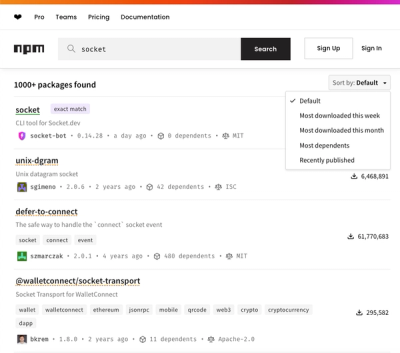
Security News
npm Updates Search Experience with New Objective Sorting Options
npm has a revamped search experience with new, more transparent sorting options—Relevance, Downloads, Dependents, and Publish Date.
rdf-object
Advanced tools
RDF Object makes it easier to read RDF data by loading it as JSON objects.
This library accepts RDFJS-compliant quads.
$ yarn install rdf-object
This package also works out-of-the-box in browsers via tools such as webpack and browserify.
import {RdfObjectLoader} from "rdf-object";
or
const RdfObjectLoader = require("rdf-object").RdfObjectLoader;
RdfObjectLoader accepts RDF quad/triple streams (or arrays) as input,
and loads the resulting graph in-memory as linked Resources.
A Resource is a wrapper over an RDFJS term that holds property links.
Using a JSON-LD context,
properties are easily accessible.
The following examples assume the following imports:
import {namedNode, literal, triple} from "@rdfjs/data-model"; // External library
import {RdfObjectLoader} from "rdf-object";
RdfObjectLoader accepts a JSON-LD context as input argument.
This context can also be the URL to a JSON-LD context.
// Initialize our loader with a JSON-LD context
const context = {
'rdf': 'http://www.w3.org/1999/02/22-rdf-syntax-ns#',
'rdfs': 'http://www.w3.org/2000/01/rdf-schema#',
'type': 'rdf:type',
'label': 'rdfs:label',
'foaf': 'http://xmlns.com/foaf/0.1/',
'knows': 'foaf:knows',
'name': 'foaf:name',
'ex': 'http://example.org/'
};
const myLoader = new RdfObjectLoader({ context });
Resources are stored inside the resources field of RdfObjectLoader,
they are indexed by URI.
Each resource has the following fields:
value: The term value. For example a URI or literal value.type: The RDFJS term type.term: The RDFJS term.// Import triples
myLoader.importArray([
triple(namedNode('http://example.org/myResource'), namedNode('http://www.w3.org/1999/02/22-rdf-syntax-ns#type'), namedNode('http://example.org/Resource')),
]).then(() => {
// Get property values by shortcut
const myResource = myLoader.resources['http://example.org/myResource'];
console.log(`URI: ${myResource.value}`);
console.log(`Term type: ${myResource.type}`);
console.log(`Term value: ${myResource.value}`);
console.log(`Term: ${myResource.term}`);
});
Alternatively, myLoader.import() can be invoked on
an RDFJS stream of triples/quads.
This can for example accept parsed turtle streams.
Multiple calls to importArray and import can be done at any time
to easily combined multiple sources.
The property field on a Resource
contains all property values.
It maps all predicates to objects,
where each predicate is a URI or JSON-LD shortcut,
and each object is a Resource.
If multiple values are present for that property, only the first will be returned.
// Import triples
myLoader.importArray([
triple(namedNode('http://example.org/myResource'), namedNode('http://www.w3.org/1999/02/22-rdf-syntax-ns#type'), namedNode('http://example.org/Resource')),
triple(namedNode('http://example.org/myResource'), namedNode('http://www.w3.org/2000/01/rdf-schema#label'), literal('My Resource')),
]).then(() => {
// Get property values by shortcut
const myResource = myLoader.resources['http://example.org/myResource'];
console.log(`URI: ${myResource}`);
console.log(`Type: ${myResource.property.type}`);
console.log(`Label: ${myResource.property['rdfs:label']}`);
console.log(`Label (bis): ${myResource.property['http://www.w3.org/1999/02/22-rdf-syntax-ns#label']}`);
});
Via the properties field on Resource,
all values of a property can be retrieved.
JSON-LD can also be used on properties.
// Import triples
myLoader.importArray([
triple(namedNode('http://example.org/myResource'), namedNode('http://www.w3.org/1999/02/22-rdf-syntax-ns#type'), namedNode('http://example.org/Resource')),
triple(namedNode('http://example.org/myResource'), namedNode('http://www.w3.org/2000/01/rdf-schema#label'), literal('My Resource')),
]).then(() => {
// Get property values by shortcut
const myResource = myLoader.resources['http://example.org/myResource'];
console.log(`Labels: ${myResource.properties.label}`);
});
The raw properties (without JSON-LD shortcuts) are
available in the propertiesUri field on Resource.
The property and properties field can also be used to set new values on a resource.
For example:
// Sets a single property value
myResource.property['rdfs:label'] = new Resource({ term: literal('Name') });
// Sets multiple property values
myResource.properties['rdfs:label'].push(new Resource({ term: literal('Name 1') }));
myResource.properties['rdfs:label'].push(new Resource({ term: literal('Name 2') }));
As Resource properties map to other Resources,
nested property paths can be followed easily.
// Import triples
myLoader.importArray([
triple(namedNode('https://www.rubensworks.net/#me'), namedNode('http://xmlns.com/foaf/0.1/knows'), namedNode('https://ruben.verborgh.org/profile/#me')),
triple(namedNode('https://www.rubensworks.net/#me'), namedNode('http://xmlns.com/foaf/0.1/knows'), namedNode('https://data.verborgh.org/people/joachim_van_herwegen')),
triple(namedNode('https://www.rubensworks.net/#me'), namedNode('http://xmlns.com/foaf/0.1/name'), literal('Ruben Taelman')),
triple(namedNode('https://ruben.verborgh.org/profile/#me'), namedNode('http://xmlns.com/foaf/0.1/name'), literal('Ruben Verborgh')),
triple(namedNode('https://data.verborgh.org/people/joachim_van_herwegen'), namedNode('http://xmlns.com/foaf/0.1/name'), literal('Joachim Van Herwegen')),
]).then(() => {
// Get friend names via nested resources
const rubenT = myLoader.resources['https://www.rubensworks.net/#me'];
console.log(`Friends of ${rubenT.property.name}:`);
for (const friend of rubenT.properties.friends) {
console.log(`* ${friend.property.name}`);
}
});
RDF lists are automatically parsed
and exposed as a JavaScript array via the
list field on Resource.
// Import triples
myLoader.importArray([
triple(namedNode('http://example.org/myResource'), namedNode('http://example.org/list'), namedNode('http://example.org/myList0')),
triple(namedNode('http://example.org/myList0'), namedNode('http://www.w3.org/1999/02/22-rdf-syntax-ns#first'), literal('A')),
triple(namedNode('http://example.org/myList0'), namedNode('http://www.w3.org/1999/02/22-rdf-syntax-ns#rest'), namedNode('http://example.org/myList1')),
triple(namedNode('http://example.org/myList1'), namedNode('http://www.w3.org/1999/02/22-rdf-syntax-ns#first'), literal('B')),
triple(namedNode('http://example.org/myList1'), namedNode('http://www.w3.org/1999/02/22-rdf-syntax-ns#rest'), namedNode('http://example.org/myList2')),
triple(namedNode('http://example.org/myList2'), namedNode('http://www.w3.org/1999/02/22-rdf-syntax-ns#first'), literal('C')),
triple(namedNode('http://example.org/myList2'), namedNode('http://www.w3.org/1999/02/22-rdf-syntax-ns#rest'), namedNode('http://www.w3.org/1999/02/22-rdf-syntax-ns#nil')),
]).then(() => {
// Get friend names via nested resources
const myResource = myLoader.resources['http://example.org/myResource'];
console.log(`List values of ${myResource}`);
for (const listElement of myResource.property['ex:list'].list) {
console.log(`* ${listElement}`);
}
});
If you don't want RDF lists to be parsed automatically,
you can set normalizeLists to false in the RdfObjectLoader constructor.
If you want to create custom Resources yourself, for example during testing, then you can create them for any given term:
myLoader.getOrMakeResource(namedNode('ex:myResource'));
Alternatively, you can use createCompactedResource to easily create a resource with compacted properties:
myLoader.createCompactedResource({
'@id': 'http://example.org/myId',
propertyLiteral: '"abc"',
propertyWithList: {
list: [
'"abc"'
]
},
propertyWithNestedHash: {
nestedProperty: {
'@id': 'http://example.org/mySubId',
}
},
propertyWithResource: myLoader.getOrMakeResource(namedNode('ex:myResource')),
});
Special field cases:
Values can be nested hashes, for which other Resources will be created. String values will be converted into term sources following the semantics of rdf-string.js. Values can also be Resources or RDF/JS terms.
createCompactedResources is equivalent, but accepts an array (or hash) as input,
and converts it into an array of resources.
This software is written by Ruben Taelman.
This code is released under the MIT license.
FAQs
Loads RDF as JSON objects
The npm package rdf-object receives a total of 6,882 weekly downloads. As such, rdf-object popularity was classified as popular.
We found that rdf-object demonstrated a healthy version release cadence and project activity because the last version was released less than a year ago. It has 0 open source maintainers collaborating on the project.
Did you know?

Socket for GitHub automatically highlights issues in each pull request and monitors the health of all your open source dependencies. Discover the contents of your packages and block harmful activity before you install or update your dependencies.

Security News
npm has a revamped search experience with new, more transparent sorting options—Relevance, Downloads, Dependents, and Publish Date.

Security News
A supply chain attack has been detected in versions 1.95.6 and 1.95.7 of the popular @solana/web3.js library.

Research
Security News
A malicious npm package targets Solana developers, rerouting funds in 2% of transactions to a hardcoded address.